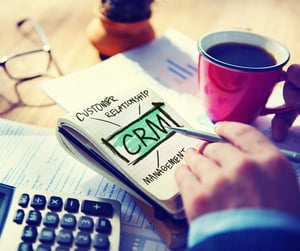Share this
How to Choose the Right CRM for Your Business
by Robert McNicholas on May 30, 2017
 Do anything business-related online and you’re likely to see ads for Customer Relationship Management (CRM) apps. What are these handy programs? Does your business need one?Gone are the days of the desktop Rolodex. Going are the days of the Excel-fueled database. What’s on the horizon? Customer Relationship Management software, known to its friends as just plain CRM.What do CRMs do?
Do anything business-related online and you’re likely to see ads for Customer Relationship Management (CRM) apps. What are these handy programs? Does your business need one?Gone are the days of the desktop Rolodex. Going are the days of the Excel-fueled database. What’s on the horizon? Customer Relationship Management software, known to its friends as just plain CRM.What do CRMs do?
Today’s CRM can be cloud-based or stored on a local computer. It begins where the vanilla spreadsheet or database leaves off. Not only does it keep track of the vital details of clients and customers, it can also keep track of suppliers, inventory, and a host of other things.Of course, not every CRM will have the same features. But here’s a representative sample of some of the bells and whistles on popular offerings:
- Manages customers and potential customers
- Tracks orders, inventory data, and customer complaints
- Reports and forecasts sales and revenue
- Monitors the effectiveness of sales, service, and marketing
- Automates basic emails (followups, autoresponders, etc.)
- Sends reminders for project deadlines and client interactions
- Interfaces with accounting, shipping, productivity apps, and other common software
- Integrates or monitors your business’s social media
That’s a pretty impressive list, but it begs one other question:
What Can CRMs Do for You?
The right CRM can lead to better sales, greater efficiency, and a general sense of “My, aren’t I organized!” Notice, though, these are the side effects of the right CRM app. Choose an app that’s too complicated to set up, too hard to use, or that has features that don’t match your needs, and it’s a different ballgame. In that case, look for confusion, frustration, and general non-usage.
How to Choose the Right CRM for Your Business
If you look at the best-loved CRMs—SugarCRM, Insightly, Nimble, Zoho, Salesforce.com, and ACT! are good examples—you’ll notice that the difference is not in the fundamentals. A CRM manages contacts across various stages in their journey as your customer, supplier, etc. The difference is in the details, but these details can make or break the product.So, if you’re considering adopting a CRM, consider these points:
- How many people will use it? An enterprise-level CRM might be too cumbersome for a smaller business.
- How much will it cost? For the very smallest businesses, some CRMs offer a free basic membership. Others are billed as a one-time fee, on a recurring subscription basis, or by the number of users.
- Do I need onsite or cloud-based? If you have people accessing your CRM remotely, cloud-based is far more convenient.
- Which features will I use? Pretty self-explanatory. Be practical, and don’t succumb to the siren song of more. More features can simply mean more confusion.
At Techsperts, we know that setting up your business software can be tricky, so we’re here for you. Read our blog for ideas, or give us a call anytime if you have questions! Featured image credit: 123rf.com
Share this
- Featured (119)
- Best Practices (76)
- Business (66)
- Small Business (66)
- Security (37)
- Managed Services (29)
- Business Growth (27)
- Technology News (26)
- Google For Work (22)
- it support (15)
- Social Media (13)
- Technology (11)
- Google (9)
- Malware (9)
- News (9)
- Cloud (6)
- seo (6)
- Backup Storage (5)
- Website (5)
- Communication (4)
- Productivity (4)
- Research (4)
- Analytics (3)
- Ransomware (3)
- Technology Support (2)
- Windows (2)
- anti malware (2)
- email (2)
- how to (2)
- laptops (2)
- mobile (2)
- Hubspot (1)
- twitter (1)
- April 2024 (1)
- March 2024 (2)
- November 2022 (3)
- October 2022 (1)
- September 2022 (3)
- August 2022 (3)
- December 2021 (3)
- November 2021 (3)
- October 2021 (1)
- September 2021 (3)
- August 2021 (3)
- July 2021 (1)
- March 2021 (1)
- February 2021 (7)
- January 2021 (1)
- March 2020 (1)
- August 2019 (1)
- April 2019 (4)
- March 2019 (6)
- December 2018 (10)
- November 2018 (10)
- August 2018 (1)
- July 2018 (9)
- June 2018 (4)
- May 2018 (4)
- October 2017 (3)
- September 2017 (6)
- August 2017 (6)
- July 2017 (12)
- June 2017 (12)
- May 2017 (3)
- March 2017 (5)
- February 2017 (2)
- August 2016 (2)
- June 2016 (4)
- January 2016 (1)
- December 2015 (3)
- November 2015 (3)
- October 2015 (3)
- September 2015 (3)
- August 2015 (2)
- July 2015 (4)
- June 2015 (3)
- May 2015 (2)
- April 2015 (1)
- March 2015 (1)
- February 2015 (1)
- January 2015 (2)
- November 2014 (4)
- October 2014 (11)
- September 2014 (5)
- August 2014 (6)
- July 2014 (7)
- June 2014 (8)
- May 2014 (3)
- April 2014 (3)
- March 2014 (2)

